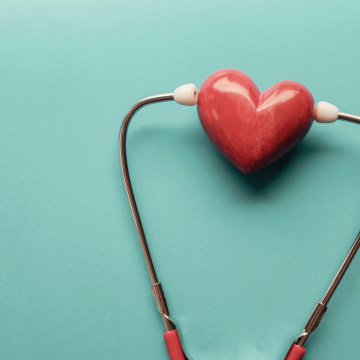
As we continue through Heart Health month, I’d like to do a deeper dive into stress management and how it can affect your heart. When discussing heart health, we tend to focus on food and fitness – however, there are other major players in the health game when it comes to your heart: stress and sleep.
There is growing evidence that stress can contribute to heart disease. Sometimes it’s difficult to recognize the impact daily stress has on our lives – we become accustomed to dealing with work, life, family, and finances, yet each of these areas create a stressful environment, and if left unchecked, can contribute to the deterioration of your health.
We can find ourselves experiencing stress at work. If you find yourself in a complicated relationship, you may experience stress. Financial issues can create anxiety and depression. If you provide care for a loved one, you are at an increased risk of stress and heart disease. In addition to these daily stress triggers, we occasionally deal with crisis issues in our lives.
How do we reduce stress? Experts will tell us to reduce stress in our lives to decrease chronic illness and improve our health. But what does this mean? Because let’s face it, the stress triggers will not miraculously disappear. However, you can practice techniques to help you handle the pressure.
While you can’t change the world around you, you can make lifestyle changes to improve how you handle stress. Today I’m going to dive into the importance of a good night’s sleep, and the role sleep plays in reducing stress.
Get Your Sleep! An average adult needs between 7.5 and 8 hours of sleep per night. Lack of quality sleep can affect your mood, energy, mental and physical health. Here are some suggestions to improve your sleep.
Get on Schedule! Develop a consistent sleep schedule. Wake up and go to sleep at the exact same time each day. Try to keep the same sleep schedule on the weekends that you do during the week. If you find you cannot fall asleep within 20 minutes, get up and do something relaxing. I find that reading helps me to fall asleep.
You are What You Eat. Pay attention to what you eat and drink. Avoid meals within a couple of hours of your bedtime. You should stay away from Caffeine, Nicotine, and Alcohol before bedtime. Alcohol may make you sleepy at first, but many people end up waking up during the night after alcohol consumption. If you notice that certain foods affect your sleep, stay away from them altogether. Everyone is different, and you need to understand what foods or beverages you need to avoid.
Zen Your Space. Create a restful environment. Your bedroom should be your sleep oasis. Many of us design our bedrooms with waking hours in mind. However, the most important thing you do in your bedroom is sleep. Keep your bedroom tidy. You don’t want to be worrying about the clutter that needs to get picked up when you are trying to fall asleep. Choose soothing paint colors instead of bright colors. If light interferes with your sleep, consider black-out shades. Keep the temperature at a level that helps you sleep. If you experience hot flashes during the night, keep the temperature cooler. Purchase a diffuser and consider aromatherapy. Lavender oil is relaxing and promotes sleep. If you sleep better with white noise in the background, turn on a fan or try one of the many white noise sleep apps available for your smartphone.
Your bedding, including your mattress, can have a significant impact on how you sleep. If your mattress is old and worn out, you may not feel great in bed. Upgrade your bedding. Your sheets, blankets, and comforters should be comfortable. Better bedding will improve your rest but could also make bedtime more inviting. Make sure you have pillows that support the curve of your neck. Consider your sleep style. Do you sleep on your back or stomach? Or do you sleep on your side? The position you sleep in can determine the type of pillow you choose. A side sleeper may rest easier on a firmer, fuller pillow. A thin, soft pillow might be better for the stomach sleepers, providing better spinal alignment. For the back sleepers, a medium firmness might work best. Quality bedding doesn’t have to be expensive, but it should be cozy.
Power Down Devices. Turn off devices before you go to bed. Exposure to the “blue light” from electronic devices can interfere with your ability to fall asleep. If this is a hard habit for you to break, try using Blue Light Blocking Glasses. Early studies indicate that these glasses have reduced LED light-induced melatonin suppression.
Evaluate Your Jams. Your sleepwear deserves some consideration. Make sure you are wearing something comfortable. Avoid tight waistbands, collars, and rough fabrics. Your pajamas should be soft. The best option might just be your “Birthday Suit.”
Take a Nap – But Not for Too Long. Limit your daytime naps. Long daytime naps can definitely interfere with your sleep. If you feel like a nap during the day, limit it to 30 minutes.
Work it Out! Include physical activity in your day. Regular exercise can promote better sleep. However, try to exercise earlier in the day to avoid late-night activity interrupting your rest. Next week, I will explore the additional benefits of how exercise can impact your health and reduce stress.
It is not unusual to have an occasional sleepless night. If you often have trouble and the above techniques are not helping you, please contact your physician. They can identify and treat any underlying causes that might be happening.
Remember, prioritizing good sleep is a form of self-love. In my opinion, a good laugh, and a long sleep are the two best cures for anything!

